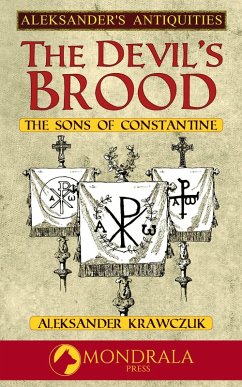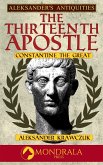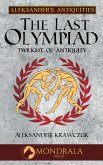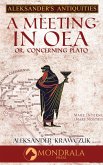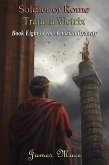"News of his father's sudden, serious illness came too late. By the time Constantius, summoned all the way from Syria, but traveling with feverish haste, finally arrived on the Bosphorus in early June, the old emperor had been dead for two weeks. The embalmed corpse, adorned with a glittering diadem and covered with a purple mantle, rested in the palace's grandest hall on a tall, golden catafalque, surrounded by the quivering glow of a thousand oil lamps and watched over by the palace bodyguard in full armor. The highest military and civilian dignitaries of the Roman Empire adored it ceremonially, observing all the requirements of court etiquette, just as they had done during the ruler's lifetime. And slowly, the entire population of Constantinoplethat's what the former Byzantium was now calledfiled past paying their last homage to the man who expanded the city, raised it to the dignity of an imperial residence, and gave it his name.
Constantius approached the catafalque ceremonially, in mournful concentration. Driven by filial love, he carefully lifted the purple cloak to take one last look at his father's face, clad in a white penitential robethe same in which the emperor was baptized a few days before his death. And at that moment, the prince saw with astonishment that the dead man's hand was clutching a papyrus scroll. He took it out gently and unrolled it. He quickly ran his eyes over the words that Constantine had scratched out with his trembling hand as he sensed the approach of inevitable death. By this means he conveyed his last will and his most secret instructions:
I die poisoned by my brothers. Therefore, I name only you, my three sons, as my heirs. At the same time, I command you to avenge with my death inflicted on me so treacherously!
The massacre began that night."
This gorgeous, troubling, moving book is, on the one hand, the tale of the reign of Constantius, a moral zero and a complete moron who could neither rule nor defend the country but who sure knew how to stay in power by murdering everyone who could ever possibly challenge him. Terror, purges, false accusations, show trials, witch hunts. The story of the murder of Gallus, slaughtered like a sacrificial lamb, will put you out of commission for an afternoon.
And on the other, the tale of a sweet, innocent, shy orphan, a prince interested in literature and philosophy, happy to be left alone with his books and his garden, whom fate will elevate to rule the empire.
This book, written in Krawczuk's signature breezy, conversational, and yet profound style, is sure to delight the fan of antiquity in you.
Treat yourself to a thrilling, beautiful, delightful week; reserve your copy today.
Dieser Download kann aus rechtlichen Gründen nur mit Rechnungsadresse in A, B, CY, CZ, D, DK, EW, E, FIN, F, GR, H, IRL, I, LT, L, LR, M, NL, PL, P, R, S, SLO, SK ausgeliefert werden.

